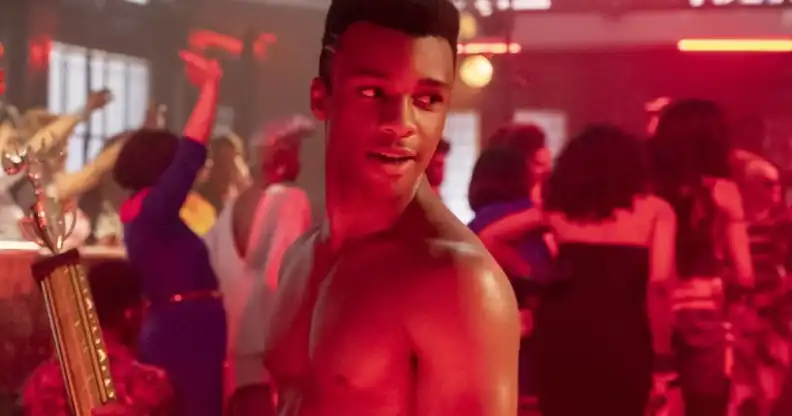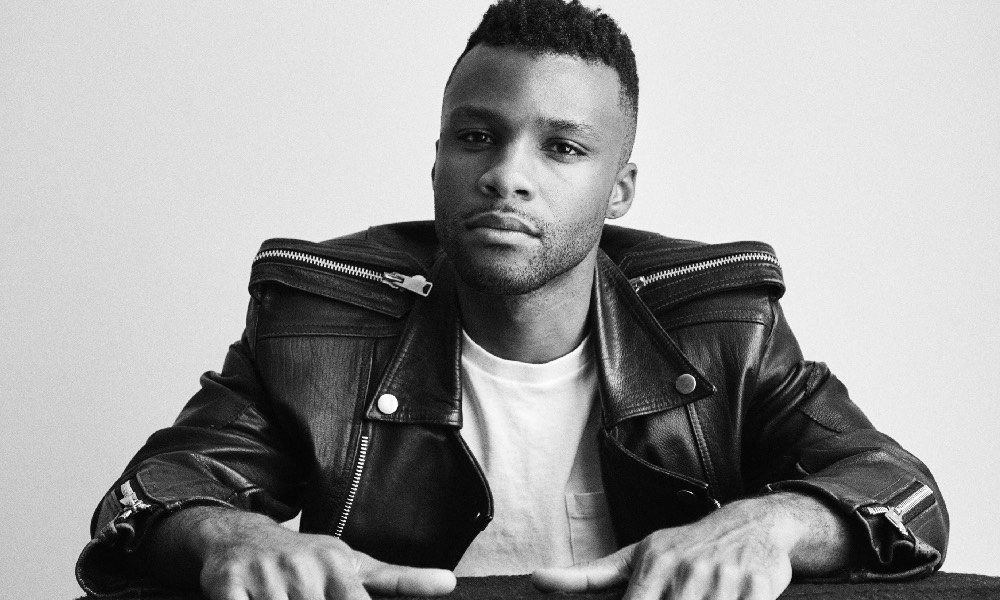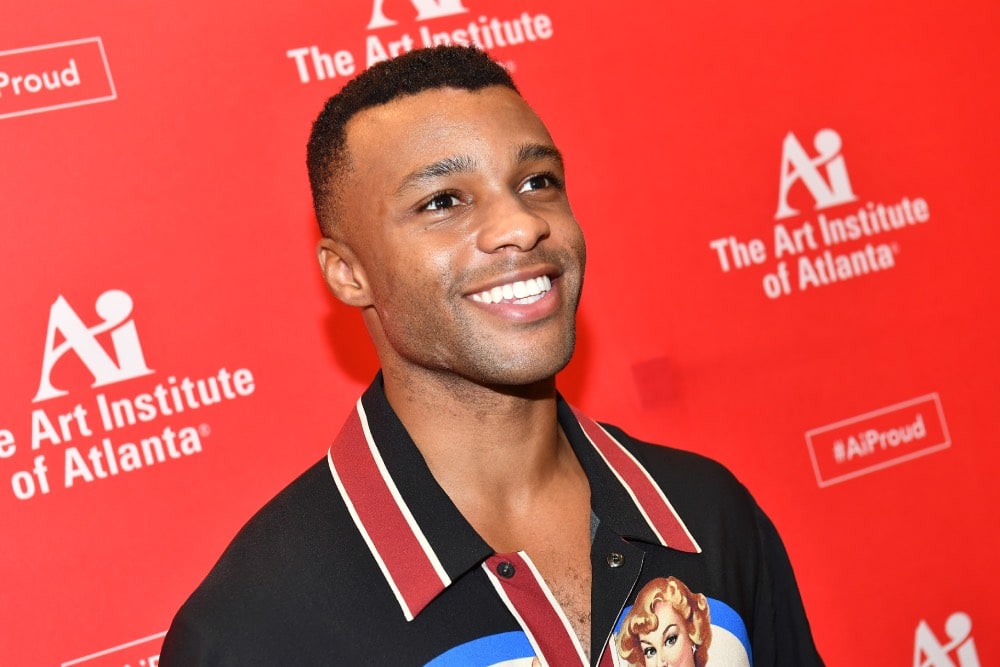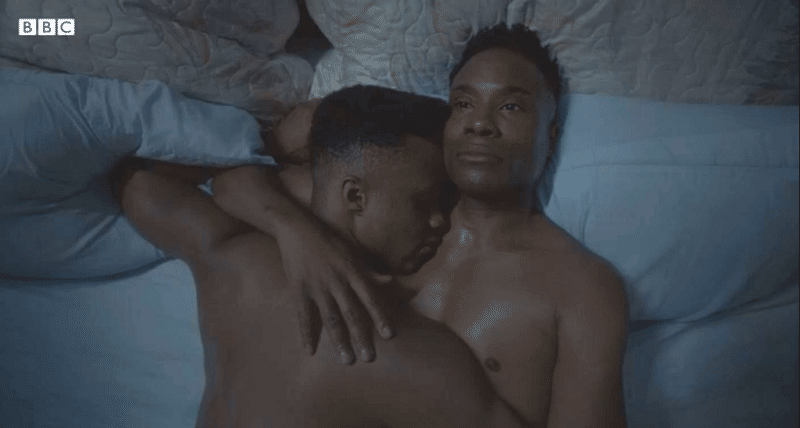Pose star Dyllón Burnside wants the church to know that gay sex isn’t just hot – it’s holy

Dyllón Burnside as Ricky in Pose. (FX)
After taking his final bow as Ricky in Pose, Dyllón Burnside wants to talk about sex.
Before he was an actor, Burnside toured with Rihanna and Stevie Wonder as part of 3D, the band he started with two cousins aged 12.
Music is the way he processes the world, Burnside told PinkNews. But the industry didn’t give him the space he needed to explore who he is, and to come into his sexuality. So he quit, making his way to Pose – and worldwide fame – via Broadway (in the Tupac jukebox Holler If Ya Hear Me). All the while, the music didn’t stop. He continued writing songs – the sort he wasn’t able to put out in his former life, that deal with religion, sex, sexuality and love. And now, he gets to share them with the world.
His new single, “Heaven”, is about the fact that for him, sex between two men is spiritual. It can be hot and dirty, but it can also be pure and transcendental. Just as importantly, it’s not something that anybody should ever be ashamed of – no matter what the church teaches.

Dyllón Burnside. (Supplied)
PinkNews: You said you wanted “Heaven” and its artwork to make a statement. What message do you hope comes across?
Dyllón Burnside: I wanted to have a conversation around the ways that we imagine heaven, the ways that we imagine God and our deities. I wanted to see myself depicted [in a stained glass window] to make a statement about Black queer bodies being able to occupy the sacred.
The song is really about repositioning the way that we understand queer love as being sacred and holy. I wanted to produce a counter-narrative to this idea that queer love is wrong or bad, or as the Catholic Church says, cannot be blessed. I wanted to push back against that. My life has been so blessed, despite what any church has ever told me would be the case. Not only do I experience blessings in my work life, and with my family and friends, but also in my love life. If God is love, and God is the pathway to heaven, then love is the pathway to heaven. And that doesn’t discriminate – that isn’t saying that only straight love is equivalent to God.
What has been your experience with the church?
I went to Christian school. I worked at a church for some time as a worship leader and creative director. I found many beautiful, wonderful things, and community, at the church, I grew a lot as an artist and so much of who I am today, I can point back to my time being involved in church. So I can’t throw the baby out with the bathwater, but I also was indoctrinated with a lot of negative thinking and harmful belief systems in church.
I think it’s important for us to tell ourselves and each other new stories. That’s what “Heaven” is about. I think that heaven looks like two men holding hands in a beautiful garden. I think it looks like two women in their home, raising their kids together. I think it looks like trans people being able to have access to anything and everything that they desire and to be able to get married and see themselves as romantic leads in television and film. To me, that’s what God looks like. That’s what heaven looks like.
Before Pose you were in a boy band, right?
Yeah, I started a group when I was 12 years old; I was a part of that group for 10 years before I moved to New York to study theatre.
Being in the music industry as a young, queer Black guy can’t have been the most straightforward thing.
That’s why I walked away from the music industry; that’s why I left the group. I felt like I couldn’t be myself. I couldn’t find truth.
I use music as my diary. It’s the way that I process the world and it’s the way that I express myself in it. I was being asked to use music to spread a message that didn’t have anything to do with that. It was about dollar signs, social media and branding.
I still hadn’t accepted my sexuality. I needed to process all of that.
I was a young guy trying to find himself as an artist and that didn’t make any sense to me. And so I was like, I can’t do this as a career, at least not at this point in my life. I still had a lot to learn about myself. I still hadn’t accepted my sexuality. I needed to process all of that. A part of the way that I did that was through music, but I wasn’t sharing that with people because I didn’t experience the music industry as being accepting of me sharing in that way.

Dyllón Burnside. (Getty)
Coming back into it now, do you see a change?
I think it has changed. I remember vividly when Frank Ocean posted [about his sexuality] on his Tumblr page, that was a big shift because Frank was already such a huge figure, particularly for Black music and R&B and hip-hop, and it changed the game. Things are very different now. We just saw Lil Nas X kiss a man on the BET Awards, and while I think that still sends shockwaves through the Black community and through the hip-hop community, it’s so important – and it’s possible [for him to do that] now. We saw BET get behind it in a way that I don’t think they would have five years ago.
Now, there’s more space now for me to create the music that I want to make, to talk about what I want to talk about, to put the visuals out in the world that I want to put out, without being told it’s career suicide. I think people are starting to get it.
The powerful thing about Lil Nas X is that he’s singing about sex. He’s singing about f**king other guys, and I love that he’s doing that at that level. Is sex something we’ll hear more of in your music?
Absolutely. Sex is all over “Heaven”. And I say it like that intentionally. Sex is all over heaven. Let’s be clear. So much of our lives is sex, and when we look at film and TV, and when we listen to music, sex is everywhere. It’s a natural part of our human experience. It would be disingenuous for me to not include sex in my music.
I think queer artists, particularly male queer artists, have been asked to sort of castrate themselves in order to sell, for so long. It’s this censoring of male on male sexuality. I push back against that. And that’s what I’m saying with “Heaven”, is that sex between men is not dirty. It’s holy, it’s sacred, it’s pure. I can relate it to my relationship with God because for me, it’s a spiritual experience.
I think it can be dirty and it can be hot and that’s great, too, and I have songs about that. But you know, I also want people to realise that it’s not just that.

Ricky and Pray Tell’s sex scene (Dyllón Burnside and Billy Porter) was hailed a watershed moment for queer Black representation. (FX)
All of that is so true of TV and film as well. It reminds me of Pose and the Ricky and Pray storyline.
That’s something that was really powerful. We had never seen it happen quite like that, on a mainstream, whatever that means, television show. And I am incredibly grateful to be a part of that history-making moment. Two Black, queer, HIV-positive men having sex on television, and it being done thoughtfully, and presented as something that’s beautiful and pure, and not salacious and dirty, and not over-sexualised. But as an expression of love, an extension of the relationship between two people.
That’s what sex is, it’s an extension of a relationship. It’s a conversation, it’s an expression. It’s a part of our human experience.

